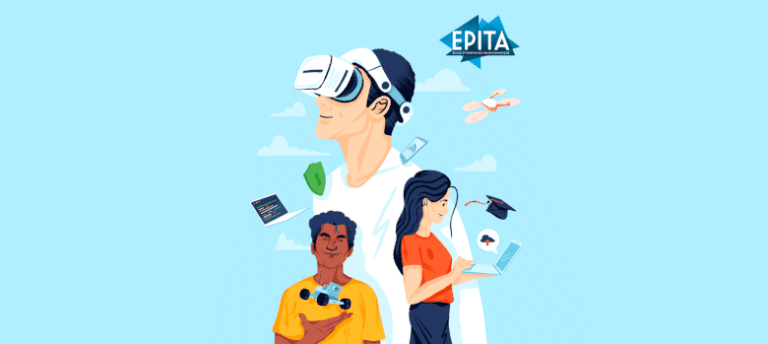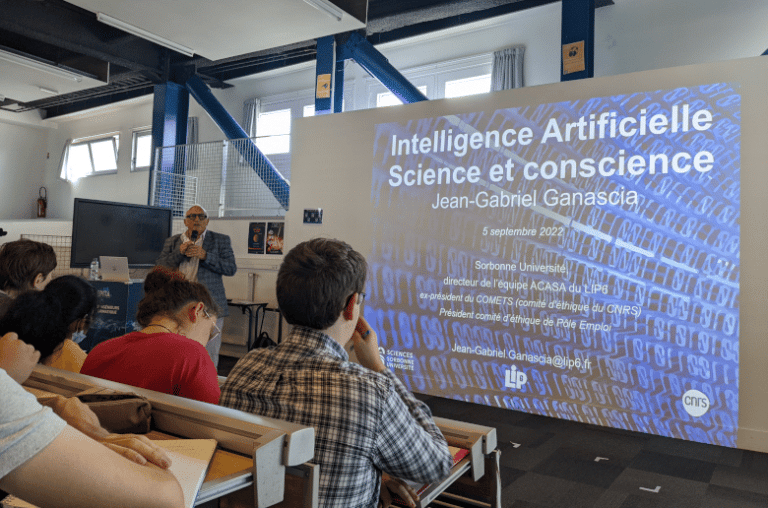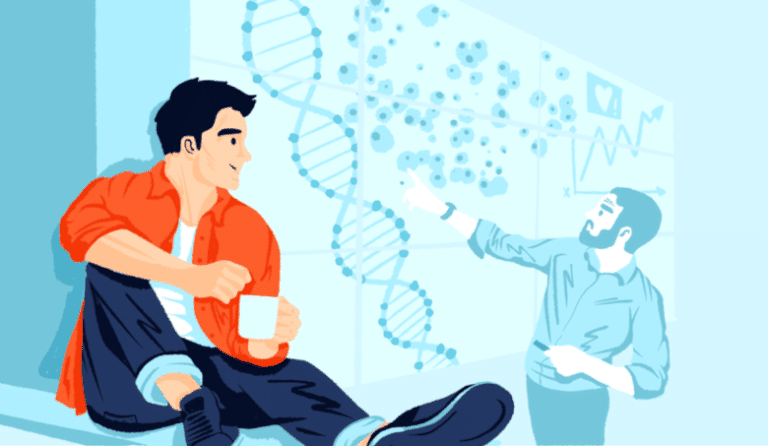RESEARCH & INNOVATION WEEK: THE FUTURE OF COMPUTING COMES TO EPITA
Organized from September 5 to 9 for 2nd year students, the 15th edition of EPITA’s Research & Innovation Week allowed future engineers to discover a variety of exciting fields!
Offering several conferences, presentations and workshops, plus a project to be carried out under the aegis of the EPITA StartUp Lab, the event gave students a broader vision of the many revolutions in which computer science plays a role, thanks to the participation of numerous researchers and recognized professionals, such as Jean-Gabriel Ganascia. The main guest at this year’s edition, a renowned researcher working at LIP6 (Sorbonne University) and recent prize winner in University Research at the FIC 2022 book award for “Servitudes virtuelles” (Seuil), Jean-Gabriel Ganascia inaugurated the week by dedicating his speech to the ethical dimension of his favorite field: artificial intelligence (AI). It was an opportunity to remind the audience, who will surely be working on the subject in the years to come, that AI plays a very important role in contemporary society. AI is at the very heart of numerous innovative technologies, from astrophysics and medicine to geology and biology, and this omnipresence also requires a reflection beyond pure technology. We can say that Rabelais’ famous quote, “Science without conscience is but the ruin of the soul,” remains more relevant than ever almost 500 years after it was written!

Conferences to decipher technologies
Jean-Gabriel Ganascia was, of course, not the only speaker to captivate EPITA students, both in Paris and other regions (most of the conferences were broadcast live on the school’s various campuses). Gwendal Simon, network architect at Synamedia Rennes and Chevalier des Palmes académiques, took advantage of his time on the Rennes campus to share what goes on behind the scenes of Internet videos, revealing the computer sciences that make this continuous flow possible. As for David Monniaux, CNRS research director at Verimag laboratory in Grenoble, he chose to focus on the problems of software verification through tests and mathematical proof, used for example in the avionics industry, trains, rockets, and autonomous cars, i.e., systems that can directly impact human lives, privacy or the economy and society at large.

Some researchers preferred to encourage students to take an interest in the infinitely small, such as Matthieu Montes, professor of structural bioinformatics at CNAM, who came to discuss the interactivity of molecular visualizations and simulations, or the infinitely large, like Jérémie Vaubaillon, astronomer and head of the CaBeRNET project at the Paris Observatory, which, together with EPITA, is working on tracking meteors using image processing. These two opposing spectrums show how much computer science plays a major role in research!
Industrial research is also on the agenda
Other speakers focused on the behind-the-scenes aspects of decentralized learning (Sonia Ben Mokhtar, CNRS research director at the LIRIS laboratory) or on deciphering the automated evaluation of the security of connected objects (Jérôme François, researcher at INRIA Nancy). Two members of Société auxiliaire des distributions d’eau (SADE) at Véolia – Hélène Ser, head of Digital Strategy, and Khomdeth Ratsavong, Project Director – as well Xavier Yvonne, a graduate of the Ecole Normale Supérieure and doctor of mathematics, who graduated from EPITA (class of 2020) to become an R&D engineer in radar algorithms and electronic warfare at Thales DMS, gave the engineering students an overview of research and the contribution of digital innovation in the industrial sector. This was an inescapable comparison, as these fields are also rapidly developing within companies.

Researchers and startups, two facets of innovation!
Playing an essential role at EPITA, the school’s researchers and experts also hosted several conferences. Didier Verna, teacher-researcher at the EPITA Research Laboratory (LRE), gave a didactic lecture to explain the reality of a researcher’s job and, perhaps interest future engineers in a new vocation, some of whom could even join the school’s laboratory while working towards their degrees. Marc Plantevit and Philipp Schlehuber, also researchers at the LRE, chose to discuss, respectively, black box models (whose inner workings are essentially unknown) and the different angles of robotics. Juliette Chansard and Arnaud Lemettre, two members of 3IE, theschool’s digital experimentation and new uses laboratory, focused on dissecting today’s World Wide Web!
Finally, entrepreneurship, often synonymous with innovation, was also addressed, thanks to lecturers such as Guillaume Dion, Incubator Manager at IONIS361 and Daniel Jarjoura, Director of the EPITA StartUp Lab, two entities designed and conceived to encourage the development of promising projects. And to encourage future entrepreneurs to take the plunge, two alumni, who created their own companies, agreed to share their experiences as well as their educational and professional journeys: Hélène Levrault (EPITA class of 2012), co-founder & CTO of Verdikt a platform for the ecological performance of digital companies, and Killian Huyghe (class of 2015), co-founder of Alex Legal, a platform specialized in the digitalization of corporate law. Two incredibly inspiring speeches!


